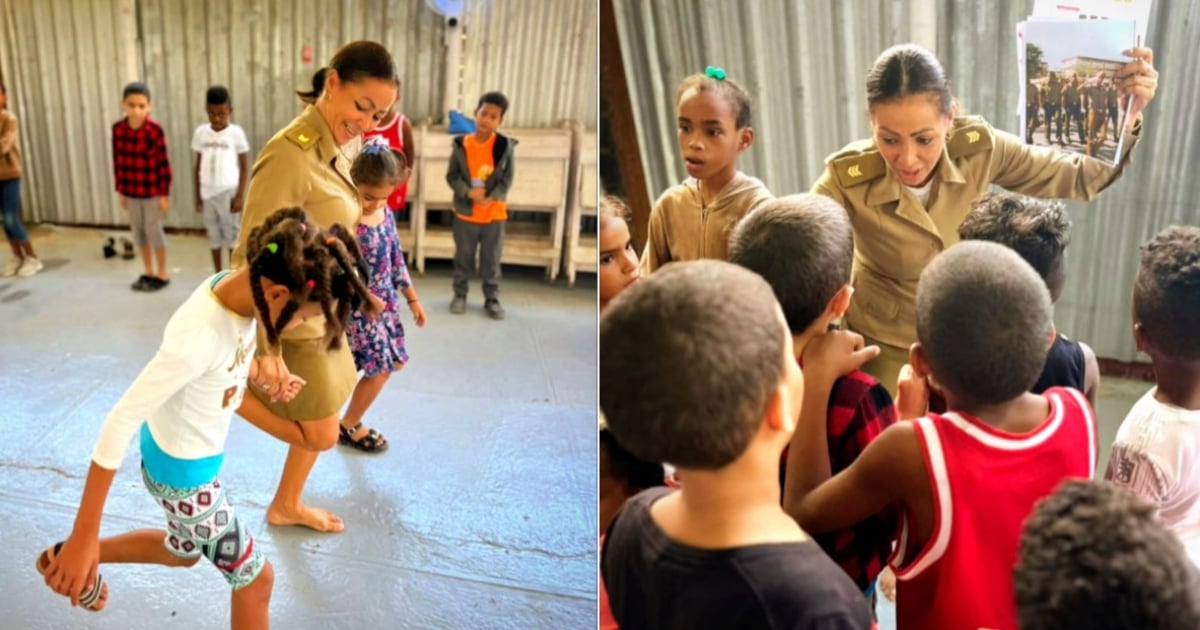In a concerning development, the Cuban regime's indoctrination efforts have reached new heights. Collaborating with a Christian church in Havana, a captain from the Revolutionary Armed Forces (FAR) has been instructing children on various military life aspects. This unsettling event highlights how far the regime is willing to go to instill its ideology in the youth.
The Spiritual Restoration Movement recently posted on their Facebook page, showcasing Captain Jeibys Sandoval of the FAR engaging with children on military-related topics. During this session, children were prompted with questions designed to normalize military life, such as "How can one pursue a military career?", "What is the role of the FAR in our country?", and "What is a soldier's life like?". These inquiries served as a vehicle for teaching military drills and formations, reinforcing the regime's ideology from a young age.
The church described the event as "a joyful morning filled with questions and new experiences" for the children, thanking the parents for their trust and concluding with the phrase, "We sow in the present to reap in the future." This incident sheds light on the regime's use of various tools over the past 60 years, including the education system and state media, to indoctrinate the populace and ensure loyalty from an early age.
What stands out in this case is the regime's influence within a Christian church, exposing a dangerous alliance that leverages a space with a guaranteed audience, thereby reaching a new level of indoctrination. In the comments section, several users expressed their disapproval of this collaboration between the church and the regime. Deniris Ponce De León questioned, "Did they also explain that this same system banned and discriminated against all individuals for their faith and religion? That believers in God were removed from their jobs and even imprisoned? Was that explained?"
Another user, identified as Asere Backagain, remarked, "'Spiritual Restoration'? A place where they teach to idolize, to kill, to destroy others in the name of a diabolical ideology, bringing in military personnel who instill the opposite of Christ's teachings. Seriously?" In a sarcastic tone, José Díaz Guerra added, "I imagine they also have a PCC and UJC nucleus functioning there."
In a related instance of political indoctrination, the ruler Miguel Díaz-Canel recently demonstrated how the regime seizes every opportunity to reinforce its narrative. On the eighth anniversary of dictator Fidel Castro's death, Díaz-Canel did not miss the chance to commemorate the date with his apparent favorite activity: propaganda and indoctrination.
The self-proclaimed leader of "continuity" and first secretary of the Communist Party of Cuba used social media to honor Castro with a series of slogans and empty phrases typical of the official discourse. He supplemented this with a video of his recent meeting with Cuban children at the Palace of the Revolution, once again using the youth to perpetuate the regime's cult.
Understanding the Impact of Military Indoctrination in Cuba
What is the significance of military indoctrination in Cuba?
Military indoctrination in Cuba is a method used by the regime to instill loyalty and reinforce its ideology from a young age. This ensures a future generation that supports the regime's narrative and maintains its power.
Why is the involvement of a church in military indoctrination significant?
The involvement of a church in military indoctrination is significant because it reveals how the regime exploits trusted community spaces to reach a captive audience, thus broadening its influence and control over public perception.
